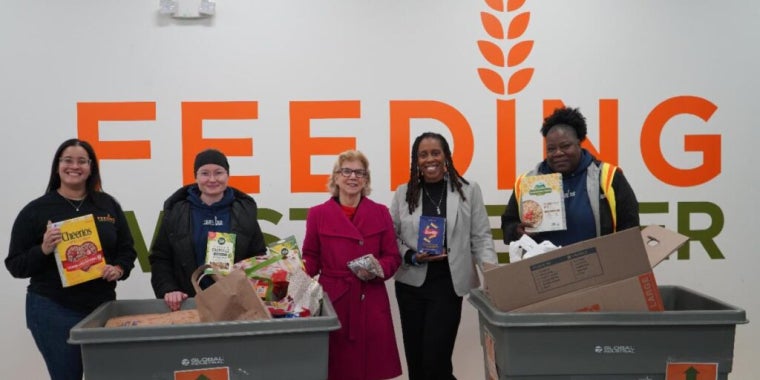
45,000 Households in Westchester Need SNAP to Feed their Families

Westchester residents might have been surprised to learn that 45,000 households in our county and 73,000 Westchester residents receive SNAP benefits to help feed their families.
SNAP (Supplemental Nutrition Assistance Program), formerly known as “food stamps,” is a US federal assistance program that helps low-income individuals and families buy food. It is administered by the USDA’s Food and Nutrition Service (FNS) and paid for by the Federal government (American taxpayers). But the program is run on the state level.
And because of the Federal budget shutdown in Washington, DC, as of November 1, USDA payments to state governments, including New York State, temporarily stopped because they did not have the funds to continue the program until a budget agreement is reached.
Fortunately, the USDA was able to reallocate its budget to provide families with half their usual benefit for the time being. $4.65 billion was released for November, which is half the normal $8B monthly cost to provide SNAP benefits to 45 million Americans — another shocking number. The average benefit for a family of 4 drops from $975 max to $488.
SNAP benefits provide funds to purchase eligible groceries (e.g., fruits, vegetables, meats, dairy, breads, cereals; not alcohol, tobacco, vitamins, hot/prepared foods, or non-food items).
Benefits are loaded monthly onto an EBT (Electronic Benefits Transfer) card, which works like a debit card at authorized retailers (grocery stores, some farmers’ markets, online via Amazon/Walmart in most states).
Eligibility is based on household income and family size. The maximum benefit for a family of four is $975 per month.
New York cannot, and did not, allocate the $650 million/month in SNAP benefits that 2.9 million New Yorkers receive.
Instead, Governor Kathy Hochul took the most aggressive state-level action in the nation by declaring a Statewide Disaster Emergency on October 30 and poured $106 million into the Emergency Food Network, which went into food banks and pantries-$40 million, $25 million to purchase additional surplus milk, apples, cheese from farms to pantries, and $41 41Million to provide 6 million extra meals.
“We can’t print EBT dollars, but we’ll make sure no child’s stomach is empty while Washington plays games,” said Governor Hochul.
Last week, Senate Majority Leader Andrea Stewart-Cousins, Sen. Shelley Mayer, County Exec. Ken Jenkins and local leaders demand that the US Department of Agriculture use contingency funds for SNAP after November 1
This is the first time in United States history that SNAP assistance would be stopped during a shutdown.
Majority Leader Andrea Stewart-Cousins said, “On November 1, millions of hardworking families and the most vulnerable New Yorkers who rely on SNAP benefits will go without food. Despite the government shutdown, the USDA could release funding but refuses to do so, which is cruel and unconscionable. I stand with my colleagues in demanding an immediate end to the shutdown and urging Secretary Rollins to release the funding families need to survive.”
State Senator Shelley B. Mayer said, “I am joined by colleagues at many levels of government to demand the United States Department of Agriculture do the right thing and release the funds necessary to feed Americans across the country, including the over 73,000 residents in Westchester alone. The USDA has made an immoral, unprecedented decision. Never before has a government shutdown disrupted the distribution of SNAP benefits. This is a political decision that will be devastating to so many – primarily children, seniors, and individuals who are disabled. I am grateful that Governor Hochul has allocated funds to help those in need and that Attorney General James is suing the USDA over this decision–– but we should be clear that this is a manufactured crisis. Under every faith tradition, it is a tenet that we must feed the hungry and help those in need. There is only one clear, moral thing to do. We call on the USDA to release the funds so Americans do not go hungry.”
Westchester County Executive Ken Jenkins said, “Families should never be caught in the crossfire of government dysfunction. The USDA has the ability — and the obligation — to act. Right now, more than 60,000 Westchester residents are facing the very real possibility of going hungry because of bureaucratic inaction. SNAP isn’t a luxury — it’s a lifeline. We’re calling on the federal government to do what’s right, use the contingency funds that exist for this very reason, and protect the people who need this support most.”
Senator Pete Harckham said, “Protecting SNAP is not about policy; it is a moral issue about fighting hunger. If Trump won’t invest in our safety net, children and seniors will pay the price. Food banks, hospitals, and community programs will be stretched to breaking point as families are left with nowhere else to turn. In the wealthiest nation on Earth, no one should go hungry, and no elected leader should ever call that acceptable.”
Assembly Member Dana Levenberg said, “Here in New York, I am proud that our state government is acting quickly to support New Yorkers who will be impacted by Washington’s completely unnecessary decision to starve needy American citizens. I applaud Governor Hochul’s decision to fast-track millions of dollars in emergency food aid. However, it is incumbent on our federal leaders to get their priorities straight immediately and use the tax dollars we send them in ways that benefit all of society, not just President Trump and his friends.
Assemblywoman Amy Paulin said, “The USDA’s failure to maintain SNAP funding is unconscionable and will have devastating consequences for thousands of families in our community who depend on this vital program to put food on their tables. We cannot stand by while 42 million Americans, including many here in Westchester, face the prospect of going hungry.”
Assemblyman Nader Sayegh said, “SNAP means food on the table for millions of American families, including many in our Westchester community. The USDA’s failure to act —to use contingency funds and keep this vital program going —is a moral failure. No family should face an empty table during the holidays because of the federal government’s neglect.”
County Legislator Shanae Williams said, “Access to food assistance should never be delayed, especially during a government shutdown.”


